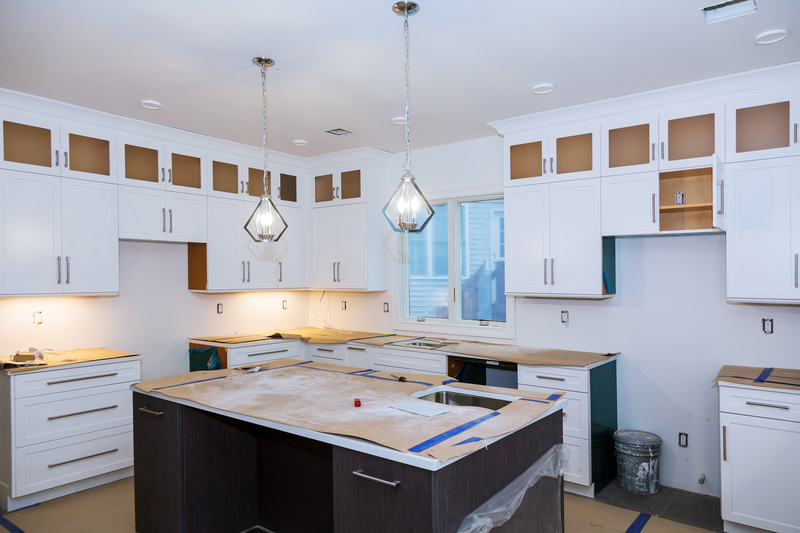Planning a home remodel? Learn how professionals use Strategic Remodeling Budgets: How Professionals Maximize Your Investment. A structured approach to budgeting and planning for home improvements is essential—professionals break down costs, plan for contingencies, and organize every step to ensure you get the most from your investment. This article provides expert tips on making every dollar count, ensuring enhanced home value without overspending on home improvements.
Introduction to Home Remodel
A home remodel represents one of the most significant investments a homeowner can make, offering the potential to transform both the functionality and aesthetic appeal of a property. Whether you’re updating a single room or undertaking a full-scale renovation, understanding the process and the home renovation costs involved is essential for setting a realistic budget and achieving a successful renovation.
Home renovation costs can vary widely based on the size and scope of your renovation project, the quality of materials chosen, and labor costs in your area. A well-structured home renovation budget should account for all costs involved, including material costs, labor, and a buffer for unexpected expenses that may arise during the process. This approach helps ensure a smooth, stress-free renovation journey.
Hiring a professional designer or project manager can be invaluable in navigating the complexities of a home remodel. These experts provide tailored guidance, help you make informed decisions, and keep your renovation project on track. By understanding the full scope of your renovation costs and planning accordingly, you can maximize your investment and enjoy a successful renovation that enhances your home’s value and livability.
Key Takeaways
- Strategic budgeting enhances home renovation value by aligning expenses with personal goals, focusing on high-impact projects for maximum ROI.
- Engaging professional designers and project managers ensures accurate estimates, efficient communication, and effective planning, reducing the risk of costly mistakes.
- Establishing a contingency fund and utilizing quality materials can mitigate unexpected costs and increase long-term savings, contributing to a successful remodeling project.
- Identifying cost-saving opportunities and avoiding unnecessary expenses through strategic budgeting helps homeowners save more money during renovations.
Why Strategic Budgeting is Crucial for Home Remodeling

Strategic budgeting is not just about keeping home renovation costs low; it’s about enhancing the overall value of your project. Understanding your personal goals and aspirations for the renovation helps in creating a budget that aligns perfectly with your vision. This approach ensures that every dollar spent contributes to making your home more functional, aesthetically pleasing, and valuable. It is also essential to understand the overall cost of the renovation project to ensure your financial plan covers all aspects.
Realistic timelines are another crucial aspect of strategic budgeting. Understanding the duration of each renovation phase helps manage expectations and keeps the project on track. A project manager can set a realistic budget and timeline while making informed financial decisions throughout the renovation. This approach avoids unnecessary stress and ensures a smoother renovation journey. Be sure to allocate contingency funds within the total budget to cover unexpected expenses and stay financially prepared.
Focusing on high-impact renovation areas maximizes your return on investment. Home renovation project efforts that significantly enhance your home’s market value ensure your renovation project efforts pay off in the long run. Whether it’s a kitchen remodel or a bathroom renovation, strategic budgeting helps you prioritize projects that offer the most significant benefits.
Renovation Project Planning
Effective renovation project planning is the foundation of any successful home improvement. The first step is to clearly define your project scope—what areas of your home you want to renovate and the specific changes you hope to achieve. Creating a detailed timeline and establishing a realistic budget are crucial for keeping your renovation project on track.
Before work begins, research the costs involved in your specific renovation project. This includes labor costs, material costs, and any necessary permits required by your local authorities. Understanding these factors helps you avoid costly mistakes and ensures you’re prepared for every stage of the process.
A thorough grasp of the renovation process and the associated costs involved empowers you to make informed decisions. It’s also wise to set aside a contingency fund to cover unforeseen costs, such as structural surprises or last-minute design changes. This financial cushion helps keep your project within budget, even when unexpected expenses arise.
Consider your financial situation and explore various financing options, such as home improvement loans or a cash out refinance, to fund your renovation project. Careful planning, combined with a clear understanding of your project scope and the costs involved, sets the stage for a successful renovation and a smoother home improvement experience.
Leveraging Professional Expertise for Accurate Estimates
Engaging a professional designer early in the renovation can transform your project from a potential financial hazard into a well-oiled machine. A design-build contractor ensures:
- Better planning
- More accurate cost estimates
- Expertise in elements like light fixtures and structural modifications, which helps avoid unexpected expenses later.
Professionals are especially valuable for complex projects that require specialized knowledge and experience, reducing the risk of mistakes.
Clear communication by a dedicated project manager ensures all parties are on the same page. Consulting multiple contractors and requesting bids provides a comprehensive view of costs, helping homeowners gather accurate estimates and make informed decisions.
Professional guidance maximizes budgets and ensures accurate initial estimates, helping to avoid costly mistakes through careful planning.
Prioritizing Projects for Maximum Impact

Prioritizing projects that significantly impact your home’s market value is crucial. Professional guidance helps homeowners identify renovations that offer the highest return on investment. Tailored strategies that consider local market trends and buyer preferences can optimize your renovation choices, ensuring that every dollar spent adds value.
Small, high-impact projects can make a significant difference without overwhelming your budget. However, it’s important to remember that rooms like the master bedroom often require a substantial portion of the budget, with house renovation costs for this space typically ranging from $10,000 to $15,000. Modern designs and features, such as energy-efficient appliances in the kitchen, are examples of upgrades that enhance both appeal and value. Focusing on high-impact areas achieves a substantial transformation in your home improvement project without unnecessary financial strain.
Kitchen Remodel
A kitchen remodel is often considered the crown jewel of home renovations due to its significant impact on both functionality and aesthetics. A well-executed kitchen renovation can add between $20,000 to $80,000 to your home’s market value, making it a top priority for many homeowners. Focusing on smart storage solutions instead of gutting the entire kitchen saves money while achieving a substantial upgrade.
Effective kitchen renovations not only improve home value but also manage renovation costs strategically. Whether aiming for modern kitchen renovations with energy-efficient appliances or updating cabinetry and countertops, a thoughtful approach ensures a successful remodel within your budget.
Detailed Breakdown of Costs Involved

Understanding the detailed cost breakdown in a home renovation is crucial for effective budgeting. Typical home renovation projects range between $19,514 and $87,474, with the average house renovation cost hovering around $49,979. These costs have surged by up to 60% since 2020, influenced by factors such as the quality of materials, scope of upgrades, and square footage. Renovation costs are often calculated on a per square foot basis, allowing homeowners to compare and budget for different projects more accurately.
A comprehensive floor plan should include expected costs for both labor and materials, along with cost estimates for each part of the project. The choice of flooring materials can significantly impact both your budget and the final look of the renovated space, as different flooring materials vary widely in price and appearance. Breaking down renovation costs by project and room clarifies each aspect’s contribution to the overall budget, making detailed breakdowns of cost management easier.
Labor Costs
Labor costs can vary widely and significantly impact your overall budget. Multiple contractors can escalate labor costs due to differing rates and project management complexities. These costs are critical for making informed financial decisions in remodeling projects.
Strategic planning and understanding labor costs help homeowners better manage their budget and avoid unnecessary expenses. Centralizing project management and employing the right contractor cuts costs and ensures a smoother renovation process.
Material Costs
Material costs significantly impact your home renovation budget. Professional contractors often have established relationships with suppliers, which can lead to better pricing on materials. Knowledge of alternative materials and efficient methods further reduces costs without compromising quality.
Ways to save on building supplies include:
- Attending building supply auctions
- Using salvaged materials from recycling centers
- Opting for standard sizes over custom options
- Using gently used plumbing fixtures on your DIY route.
These strategies cut costs significantly, helping stay within budget.
Creating a Home Renovation Budget
Crafting a realistic budget is a cornerstone of any successful home renovation project. Start by breaking down all the costs involved, including labor costs, material costs, and a reserve for unexpected expenses. This detailed approach ensures your home renovation budget is both comprehensive and practical.
To get a more accurate estimate, gather quotes from multiple contractors. Comparing bids helps you understand the range of costs involved in your renovation project and allows you to make informed choices. Don’t forget to include the costs of selecting materials, hiring a professional designer or project manager, and obtaining any necessary permits.
Budgeting tools and software can be invaluable for creating a detailed and realistic budget that aligns with your financial goals. These tools help you track spending, adjust for unexpected expenses, and ensure your renovation project stays on course.
When planning your home renovation, consider the long-term savings and return on investment. Upgrades that boost curb appeal or improve energy efficiency can increase your property’s value and reduce future maintenance costs. By focusing on a realistic budget and making strategic choices, you set the stage for a successful renovation that enhances both your home and your financial well-being.
Utilizing Financing Options Effectively
Effective financing is crucial to maintaining a healthy cash flow and avoiding financial strain during renovations. Homeowners can borrow up to 80% of their home’s equity for renovation costs through a home equity loan and lines of credit. A cash out refinance can also be a viable option. Home improvement loans typically feature fixed interest rates and terms ranging from 5 to 30 years, making them a stable financing option.
It is also worth exploring government grants as a potential source of funding for home renovations, especially for projects focused on energy efficiency or historic preservation.
Alternatives such as personal loans and credit cards offer different benefits and can be explored based on your financial situation. Determining financing methods before building your remodeling budget ensures coverage of extra costs and achievement of financial goals.
Creating a Contingency Fund for Unexpected Expenses
A contingency fund ensures you can handle unexpected expenses during your renovation. Experts recommend allocating an additional 10-20% of your renovation budget for unforeseen costs. This cushion covers unexpected expenses like lighting or utility upgrades and structural issues.
A contingency fund ensures the project can be completed even if costs exceed projections. Planning for additional expenses avoids financial strain and keeps the renovation on track.
The Role of a Project Manager in Successful Renovations

A project manager oversees various aspects of a renovation, including scheduling, resource allocation, and quality control. Effective project management prevents delays and budget overruns by ensuring all tasks are adequately planned and executed.
Hiring a professional general contractor offers several benefits:
- Ensures compliance with local building codes, reducing the risk of legal issues.
- Facilitates communication among all parties by serving as a single point of contact.
- Leverages industry experience to anticipate and manage potential project delays.
Centralizing project management and employing the right contractor helps homeowners achieve a successful remodel during their remodeling project within their budget and goals.
Executing the Renovation Plan
Bringing your renovation project to life requires collaboration with a skilled team of professionals, including contractors, designers, and project managers. Clear communication about your expectations, budget, and timeline is essential to ensure your successful renovation stays on track and meets your vision.
Careful planning and attention to detail are key throughout the renovation process. Be prepared to adapt to changes and unforeseen costs, as even the best-laid plans can encounter surprises. Flexibility and open communication with your renovation team help you navigate these challenges smoothly.
To save money, consider exploring alternative materials, shopping for supplies during sales, or taking the DIY route for certain aspects of the renovation. These strategies can help you cut costs without sacrificing quality or style.
Regular progress updates and ongoing dialogue with your team keep you informed and engaged, ensuring the renovation project is completed to your satisfaction. By staying proactive and involved, you can achieve a successful renovation that brings your vision to life while managing costs effectively.
Long-Term Savings Through High-Quality Materials
Investing in high-quality materials may seem costly upfront, but it lowers future maintenance expenses and enhances property value. Durable materials prevent issues like water damage and inefficiency in heat retention, leading to long-term savings.
Choosing renewable and sturdy materials fosters sustainability and ensures longevity. Opting for high-quality materials ensures a successful renovation that aligns with financial goals and cuts long-term costs.
Maximizing ROI with Tailored Guidance
Tailored guidance from experienced professionals significantly enhances your return on investment (ROI). An experienced project manager provides cost-effective solutions and problem-solving strategies aligning with your financial goals. Understanding the expected ROI from specific projects helps homeowners make informed decisions and maximize their investment.
Advisors often emphasize cosmetic upgrades that also address functional improvements, increasing overall value. Working with professionals ensures your remodeling projects are cost-effective and aligned with your financial goals.
Tracking and Adjusting Your Remodeling Budget

Tracking and adjusting your remodeling budget is vital for staying on track and managing financial resources effectively. Here are some key points:
- Budgeting tools like HomeZada and Mint provide comprehensive financial overviews and allow homeowners to create renovation-specific budgets.
- Regularly compare actual costs with the budget to identify discrepancies.
- Adjust the budget accordingly based on these comparisons.
Staying proactive with budget adjustments keeps your project on track, even when figures shift. Continuously monitoring and adjusting your budget ensures a successful remodel that aligns with your financial goals.
Evaluating Renovation Success
Once your renovation project is complete, it’s important to evaluate its success by considering whether your goals were met, the project stayed within budget, and the functionality and aesthetic appeal of your living spaces were enhanced. Assessing the return on investment and the impact on your property’s value and resale potential can help you determine the overall effectiveness of your home improvement projects.
A successful renovation not only improves your home’s appearance but can also increase energy efficiency, reduce maintenance costs, and elevate your quality of life. Take time to reflect on the process and use your experience to inform future home improvement projects, making even more informed decisions about your property.
By carefully planning, executing, and evaluating your renovation project, you can create your dream home—one that meets your needs, enhances your lifestyle, and increases your property’s value for years to come.
Summary
Strategic budgeting is essential for a successful home renovation. A comprehensive remodeling budget should account for all aspects of the home’s interior, including essential upgrades like air conditioning, to ensure a thorough and effective renovation. By leveraging professional expertise, prioritizing high-impact projects, understanding detailed cost breakdowns, and utilizing effective financing options, you can maximize your investment. Creating a contingency fund and investing in high-quality materials further ensures long-term savings and value enhancement.
In conclusion, a well-planned renovation aligns with your financial goals and enhances your property’s overall value. By following these guidelines, you can embark on your remodeling journey with confidence and achieve a successful renovation that transforms your home into your dream living space.
Frequently Asked Questions
Why is strategic budgeting crucial for home remodeling?
Strategic budgeting is crucial for home remodeling as it ensures that expenditures add value to the renovation while aligning with personal goals and effectively managing expectations. This approach ultimately leads to a more successful and satisfying remodeling experience.
How can professional expertise help in obtaining accurate estimates?
Professional expertise ensures accurate estimates by leveraging a deep understanding of specific costs and enhancing communication, thereby minimizing the risk of unforeseen expenses.
Why should homeowners prioritize certain projects in a renovation?
Homeowners should prioritize renovation projects that enhance market value, as this approach aligns their efforts with financial goals and maximizes return on investment.
What are some cost-saving strategies for materials in a renovation?
To save costs on materials during a renovation, leverage professional relationships for favorable pricing, consider alternative materials, and attend building supply auctions. These strategies can significantly reduce expenses.
How important is it to track and adjust the remodeling budget?
Tracking and adjusting the remodeling budget is crucial to keeping the project aligned with financial goals, as it helps prevent overspending and financial strain. Consistent monitoring facilitates effective decision-making throughout the remodeling process.

